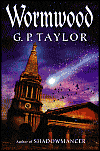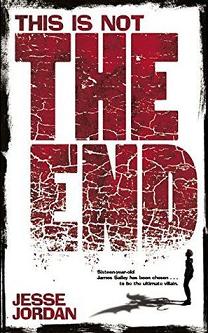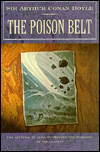
Wormwood, by G. P. Taylor
Book Review by Heather Hunt
Have you read this book?
This sophomore effort from the former Sex Pistols' roadie, self-published
author, and current vicar, G.P. Taylor, is a disappointment. As a follow-up
to the mesmerizing "Shadowmancer," "Wormwood" still deals with dark
spiritual themes, the supernatural, magic, science, and medieval England. It
is also still categorized as Young Adult, but this is the first problem.
There is one young adult, fourteen-year-old Agetta, featured prominently in the story. But she is not the main protagonist, and the story is only occasionally told from her point of view. In fact, the changing point of view is the second problem.
Sabian Blake, a London scientist, member of the Royal Society, and sometime alchemist, is the main protagonist. The novel begins with his perspective, leaves it in spurts to follow Agetta's sorry life, but returns regularly and most often to Blake's story. Unfortunately, Blake is not a character who engenders much empathy from adults, let alone the teenagers for whom this book is intended.
Taylor did his homework and describes the London of a few hundred years ago in all its squalid vividness. The constant dark dreariness doesn't make for an enjoyable read, however.
Wormwood commits the cardinal sin for young adult novels of not having Agetta ultimately come up with her own means of salvation. In fact, she doesn't change all that much from beginning to end. She's an innocent victim throughout with no flaws other than petty thievery to overcome.
Sabian Blake makes the most changes, but his transformation is only tangentially related to Agetta's story. She doesn't do anything to help him change, they both just happen to be caught up in the same chain of events.
Taylor has a capable writing style, but his editors would have served him better by forcing him to decide whether Wormwood would be an adult or a young adult novel. They also could have molded the plot into a more logical progression that didn't leave some plot points dangling, such as Agetta's invalid mother, who isn't cured, changed, or killed. By the end of the story, she disappears from the narrative altogether although her buildup in earlier chapters led this reader to believe Agetta might have some part in saving her mother.
I'm looking forward to more work by G. P. Taylor, but I returned the library's copy of Wormwood with no plans to purchase it for my own bookshelf.
There is one young adult, fourteen-year-old Agetta, featured prominently in the story. But she is not the main protagonist, and the story is only occasionally told from her point of view. In fact, the changing point of view is the second problem.
Sabian Blake, a London scientist, member of the Royal Society, and sometime alchemist, is the main protagonist. The novel begins with his perspective, leaves it in spurts to follow Agetta's sorry life, but returns regularly and most often to Blake's story. Unfortunately, Blake is not a character who engenders much empathy from adults, let alone the teenagers for whom this book is intended.
Taylor did his homework and describes the London of a few hundred years ago in all its squalid vividness. The constant dark dreariness doesn't make for an enjoyable read, however.
Wormwood commits the cardinal sin for young adult novels of not having Agetta ultimately come up with her own means of salvation. In fact, she doesn't change all that much from beginning to end. She's an innocent victim throughout with no flaws other than petty thievery to overcome.
Sabian Blake makes the most changes, but his transformation is only tangentially related to Agetta's story. She doesn't do anything to help him change, they both just happen to be caught up in the same chain of events.
Taylor has a capable writing style, but his editors would have served him better by forcing him to decide whether Wormwood would be an adult or a young adult novel. They also could have molded the plot into a more logical progression that didn't leave some plot points dangling, such as Agetta's invalid mother, who isn't cured, changed, or killed. By the end of the story, she disappears from the narrative altogether although her buildup in earlier chapters led this reader to believe Agetta might have some part in saving her mother.
I'm looking forward to more work by G. P. Taylor, but I returned the library's copy of Wormwood with no plans to purchase it for my own bookshelf.
|
Click here to buy Wormwood, by G. P. Taylor on Amazon
|
Wormwood, by G. P. Taylor on Amazon

| More Books You Might Like |
Comment on Wormwood, by G. P. Taylor
| Comments on Wormwood, by G. P. Taylor |
| There are no comments on this book. |


